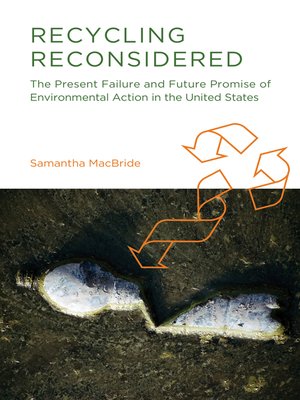Recycling Reconsidered
ebook ∣ The Present Failure and Future Promise of Environmental Action in the United States · Urban and Industrial Environments
By Samantha Macbride

Sign up to save your library
With an OverDrive account, you can save your favorite libraries for at-a-glance information about availability. Find out more about OverDrive accounts.
Find this title in Libby, the library reading app by OverDrive.



Search for a digital library with this title
Title found at these libraries:
| Library Name | Distance |
|---|---|
| Loading... |
Recycling is widely celebrated as an environmental success story. The accomplishments of the recycling movement can be seen in municipal practice, a thriving private recycling industry, and widespread public support and participation. In the United States, more people recycle than vote. But, as Samantha MacBride points out in this book, the goals of recycling—saving the earth (and trees), conserving resources, and greening the economy—are still far from being realized. The vast majority of solid wastes are still burned or buried. MacBride argues that, since the emergence of the recycling movement in 1970, manufacturers of products that end up in waste have successfully prevented the implementation of more onerous, yet far more effective, forms of sustainable waste policy. Recycling as we know it today generates the illusion of progress while allowing industry to maintain the status quo and place responsibility on consumers and local government.
MacBride offers a series of case studies in recycling that pose provocative questions about whether the current ways we deal with waste are really the best ways to bring about real sustainability and environmental justice. She does not aim to debunk or discourage recycling but to help us think beyond recycling as it is today.







